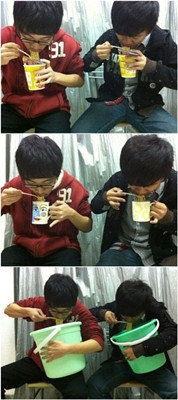(单词翻译:单击)

Would you describe yourself as ordinary, artistic, idiotic, or maybe something else?
你觉得自己是个普通青年、文艺青年、二逼青年还是别的什么青年?
Over the past few days, the creation of a new word, which is a combination of three individual words, to describe Chinese youth has created a major buzz on the country's leading social network websites.
近几天,一个用来描述中国青年的新词在国内主要社交网站上炸开了锅,该词其实由三个独立的词语组成。
"Pu-wen-er", which combines the abbreviations for putong (ordinary), wenyi (artistic) and erbi (idiotic), has become the hot new expression to describe China's ordinary, artistic and idiotic youth.
普文二一词由普通、文艺和二逼这三个词组合而成,是近日网络上火爆的一个新兴说法,指的是中国那些普通、文艺而又二逼的青年人。
The three words, which allow three items to be humorously grouped together under the same category, has become hugely popular, as tens of thousands of young people rushed to tag themselves on the Internet.
这个词儿很诙谐地将三种青年归类到同一个标签下,广受欢迎。成千上万的年轻人纷纷在网络上给自己贴上标签。
It all started around Oct. 24 when a netizen named "Daxian" launched a campaign on Douban.com to compare the differences between three kinds of young people. In just a few days, the campaign attracted tens of thousands of composite photos and phrases posted by netizens as they sought to interpret modern life through the younger generation's eyes.
这一切都始于10月24日,网友大仙在豆瓣网发起活动来比较这三类青年的区别。短短几天,活动就吸引了十几万人参与,网友们用五花八门的合成图和段子诠释着当下青年们的现实生活。
The composite photos usually consisted of three images of a young person in his or her ordinary, artistic and idiotic forms, representing his or her ordinary characteristics, cultural sensibility and funny or socially awkward deeds respectively.
这些合成图通常包含一个青年的三种形象:普通、文艺和二逼,分别指代此人的普通属性、文艺范儿及犯二表现。
Netizens also posted composite photos of celebrities, animals, plants, cartoon characters and video game characters with three apparent pu-wen-er statuses on social network websites.
网友们还在社交网站上贴出一些名人、动物、植物、卡通人物及游戏角色的合成图,来戏谑他们经典的三种普文二状态。
Similar to the photos, the phrases also attempt to describe the rosy, romantic mood of artistic youth and the humorous or extremely frank attitude of idiotic youth.
与图片类似,网上的一些段子也用以描述文艺青年的小资、浪漫情结以及二逼青年搞笑、过于直白而没心没肺的生活态度。
词汇点津:
artistic 艺术的,风雅的,有美感的
idiotic 白痴的,愚蠢的
abbreviations 缩写 tag 尾随,紧随



The three types of youth have their own fans. "Pu" fans enjoy a low profile, ordinary life; "wen" fans prefer a more romantic outlook, while "er" fans love to be frank, unique or idiotic, as the mood takes them.
三种青年都有各自的拥趸者。普通青年是正常、低调的代名词,文艺青年偏向浪漫情怀,而二逼青年往往直白坦荡、特立独行,或者说是喜欢犯二。
The new classification has certainly caught the imagination of Internet users. A netizen called "Tuzichou" from Tianjin wrote: "Since pu-wen-er was invented, I couldn't help classifying everything I can see into three types."
这种新的分类当然激发了网友们的奇思妙想。天津网友兔子抽感慨道:自从有了这个活动,看什么都自动分类的有木有!
However, an article in the China Youth Daily pointed out that it's not easy to place individuals into one, fixed group. For instance, a person might be ordinary when facing strangers, outgoing among close friends and sentimental when alone.
不过,《中国青年报》的一篇文章指出,将一个人归类到某个特定的群体是很难做到的。比方说,一个人面对陌生人就可能是个普通青年,在亲密的朋友面前会有点肆无忌惮,而一个人独处时又会多愁善感。
"Everyone has a moment of pu, wen or er respectively, and everyone could have pu-wen-er characteristics at the same time," wrote a netizen named "Chunfeng chunyu youshihao."
每个人都有普文二的瞬间,每个人都是普文二三青一体。网友春风春雨有时好如是说。 "
The three types reflect three aspects of a person," said Hou Ruihe, a psychologist and counselor at Renmin University of China. "The ordinary type adheres to common social principles, the idiotic type attempts to fight against conventions and pressures, while the artistic type seeks a balance between his or her social role and sense of individuality."
三种青年就好像三个自我。中国人民大学心理健康专职咨询师侯瑞鹤老师认为,普通青年更多地表现屈从于大众规则的社会自我,二逼青年则在压力之下采取一种过度补偿的方式反抗规则,直白天真,没心没肺。文艺青年在社会自我和个人自我之间求得一种平衡,但多少有点回避压力的意味。
According to Xiao Beiying, an associate professor at Huaqiao University, pu-wen-er fans tend to behave frivolously and the phenomenon might lead to the misunderstanding of Internet culture.
华侨大学副教授肖北婴表示,热衷给普文二青年分类的这些人往往轻浮,可能引发网络文化的误读误导。
However, Li Zhen, a professor at Zhejiang Normal University, disagreed with that assertion, commenting that the creation and spreading of pu-wen-er is an important way for young people to deal with pressure and stresses and improve social focus.
不过,浙江师范大学李震教授持有不同意见。他认为,普文二青年这个名词的出现和传播是青年缓解压力和力图获得社会聚焦的重要手段。
词语点津:
individuality 个性


